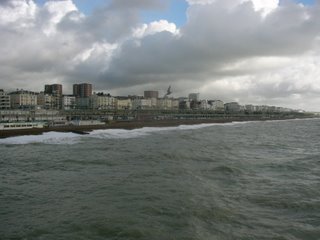10/29/2006
they know me so well
"I hope you are having a lovely weekend and enjoying some of the crisp, autumn weather. In case you feel like snuggling up with a nice, 600+ page book this evening, here are the questions for this week’s seminar."
10/24/2006
The same persons who cry down Logic will generally warn you against Political Economy. It is unfeeling, they will tell you. It recognises unpleasant facts. For my part, the most unfeeling thing I know of is the law of gravitation: it breaks the neck of the best and most amiable person without scruple, if he forgets for a single moment to give heed to it. The winds and waves too are very unfeeling. Would you advise those who go to sea to deny then winds and waves -- or to make use of them, and find the means of guarding against their dangers? My advice to you is to study the great writers on Political Economy, and hold firmly by whatever in them you find true; and depend on it that if you are not selfish or hard-hearted already, Political Economy will not make you so.
-- J.S. Mill
went for a lecture by dr charles bean today, director and chief economist of the bank of england, just to take notes, take photographs and generally cover the event so i'll be clued in as to what is going on and not be hoodwinked by my journalist.
professor pissarides stepped up to introduce him, and soon enough a woman got up and heckled something to the effect of "this is england, speak english". whyever she did so, i can't figure out. pissed off at economics professors? ultra-nationalist? couldn't here or over-hassled by ushers? an ex-mistress?
in any case, it was a pretty clear lecture replete with statistics and interesting indicators you wouldn't consider normally from your average macroeconomics course. not excessively complicated, mind you, but common sense indicators which go beyond interest rates etc. this is diagnostic economics, something like house (yes that crazy doctor), and what i think distinguishes economics today, an empirical approach to things from looking at data. that's why i don't like my macroeconomics principles course that much because there doesn't seem to be much necessarily stable or "principled" about the economy, you should always keep one eye on the data. and anyway, it is something like sach's recommended approach (to development economics) in "the end of poverty", where he suggests going around to the countries involved to collect data, understand more (kinda like talking to patients). it was interesting though, that i ran into a lady i met at summer school in beijing who's now very interested in development, and she got the impressions that charles bean had never been to china, and she was hoping more for some more insights in that regard. fair enough, but i guess his job is monetary policy in the uk (meaning he has to keep one eye on china as far as that affects inflation in the uk), but he doesn't claim it's his field of interest or expertise.
but what should i know right, i'm not an economist. but another person comes in and heckles and goes on about the voodoo banking multiplier and how all this debt hole think came about, that debt is sin etc. i must confess i was initially upset by the banking multiplier. and though the idea of money being printed by the government going straight into our pockets sounds neat and attractive, i guess people underestimate the importance of financial intermediaries in trying to push us back into the 17th century. it is difficult, though, i feel to argue with someone who doesn't try to take at least an empirical approach to data. i don't mean being able to quote statistics like "50 billion a year is wasted on... (and i didn't really get the rest of what he said)" or quoting abraham lincoln , i guess there has to be progress in the financial markets. and then i realise you need the theory to figure out that some concepts/principles are just wrong (given the world that we work with).
but the heckling made me think that some people, i think, are absolutely disgusted with economists. oh well.
also, this is another poem posted by my philosophy lecturer. yet again, a poem likes this sometimes makes me wonder if literature is not simply about weakness in all its forms, and is a desperate search by readers to find out if someone as terrible as them exists in this world. it is comforting, you know.
Why should not old men be mad?
Some have known a likely lad
That had a sound fly-fisher's wrist
Turn to a drunken journalist;
A girl that knew all Dante once
Live to bear children to a dunce;
A Helen of social welfare dream,
Climb on a wagonette to scream.
Some think it a matter of course that chance
Should starve good men and bad advance,
That if their neighbours figured plain,
As though upon a lighted screen,
No single story would they find
Of an unbroken happy mind,
A finish worthy of the start.
Young men know nothing of this sort,
Observant old men know it well;
And when they know what old books tell
And that no better can be had,
Know why an old man should be mad.
W.B Yeats
and you wonder if all these hopes you have for yourself will ever be achieved. yes, what happens to those who know all of dante?
in the end, no matter how much i claim not to believe in fate, i think deep down i must believe it. maybe it's my natural disposition, but i think sometimes that's the reason why people think i am cold/cool in certain situations, why i don't react more etc... i think sometimes that is what frustrates people most about me. i just have never had this feeling where i could control the world, and sometimes i take it too much as a given.
at the end of the term, i hope to go to italy. one of the stops will be venice, which used to be famous for the rialto and... jewish moneylenders. even in the 17th century they needed debt.
-- J.S. Mill
went for a lecture by dr charles bean today, director and chief economist of the bank of england, just to take notes, take photographs and generally cover the event so i'll be clued in as to what is going on and not be hoodwinked by my journalist.
professor pissarides stepped up to introduce him, and soon enough a woman got up and heckled something to the effect of "this is england, speak english". whyever she did so, i can't figure out. pissed off at economics professors? ultra-nationalist? couldn't here or over-hassled by ushers? an ex-mistress?
in any case, it was a pretty clear lecture replete with statistics and interesting indicators you wouldn't consider normally from your average macroeconomics course. not excessively complicated, mind you, but common sense indicators which go beyond interest rates etc. this is diagnostic economics, something like house (yes that crazy doctor), and what i think distinguishes economics today, an empirical approach to things from looking at data. that's why i don't like my macroeconomics principles course that much because there doesn't seem to be much necessarily stable or "principled" about the economy, you should always keep one eye on the data. and anyway, it is something like sach's recommended approach (to development economics) in "the end of poverty", where he suggests going around to the countries involved to collect data, understand more (kinda like talking to patients). it was interesting though, that i ran into a lady i met at summer school in beijing who's now very interested in development, and she got the impressions that charles bean had never been to china, and she was hoping more for some more insights in that regard. fair enough, but i guess his job is monetary policy in the uk (meaning he has to keep one eye on china as far as that affects inflation in the uk), but he doesn't claim it's his field of interest or expertise.
but what should i know right, i'm not an economist. but another person comes in and heckles and goes on about the voodoo banking multiplier and how all this debt hole think came about, that debt is sin etc. i must confess i was initially upset by the banking multiplier. and though the idea of money being printed by the government going straight into our pockets sounds neat and attractive, i guess people underestimate the importance of financial intermediaries in trying to push us back into the 17th century. it is difficult, though, i feel to argue with someone who doesn't try to take at least an empirical approach to data. i don't mean being able to quote statistics like "50 billion a year is wasted on... (and i didn't really get the rest of what he said)" or quoting abraham lincoln , i guess there has to be progress in the financial markets. and then i realise you need the theory to figure out that some concepts/principles are just wrong (given the world that we work with).
but the heckling made me think that some people, i think, are absolutely disgusted with economists. oh well.
also, this is another poem posted by my philosophy lecturer. yet again, a poem likes this sometimes makes me wonder if literature is not simply about weakness in all its forms, and is a desperate search by readers to find out if someone as terrible as them exists in this world. it is comforting, you know.
Why should not old men be mad?
Some have known a likely lad
That had a sound fly-fisher's wrist
Turn to a drunken journalist;
A girl that knew all Dante once
Live to bear children to a dunce;
A Helen of social welfare dream,
Climb on a wagonette to scream.
Some think it a matter of course that chance
Should starve good men and bad advance,
That if their neighbours figured plain,
As though upon a lighted screen,
No single story would they find
Of an unbroken happy mind,
A finish worthy of the start.
Young men know nothing of this sort,
Observant old men know it well;
And when they know what old books tell
And that no better can be had,
Know why an old man should be mad.
W.B Yeats
and you wonder if all these hopes you have for yourself will ever be achieved. yes, what happens to those who know all of dante?
in the end, no matter how much i claim not to believe in fate, i think deep down i must believe it. maybe it's my natural disposition, but i think sometimes that's the reason why people think i am cold/cool in certain situations, why i don't react more etc... i think sometimes that is what frustrates people most about me. i just have never had this feeling where i could control the world, and sometimes i take it too much as a given.
at the end of the term, i hope to go to italy. one of the stops will be venice, which used to be famous for the rialto and... jewish moneylenders. even in the 17th century they needed debt.
10/23/2006
i can't wait for guy fawkes day.
the lecturer did mention brighton in lectures today as part of an example on 'akrasia'. something about being able to deliberate both paths but showing an inherent bias in reasoning towards another (i.e. surfing in brighton vs going to a proper school i.e. lse).
but he has an interesting article about how people are akratic bums (let's use the word bohemian) but hanging around other akratic bums and being akratic is all right because it increases your self-image. i make it sound dumb but if you get a chance to read 'the revenge of akratic's anonymous' it's really quite a nice read.
i was always only human!
- Remember, remember the fifth of November,
- Gunpowder Treason and Plot,
- I see no reason why gunpowder treason
- should ever be forgot.
- Guy Fawkes, Guy Fawkes,'twas his intent
- to blow up the King and the Parliament.
- Three score barrels of powder below,
- Poor old England to overthrow:
- By God's providence he was catch'd
- With a dark lantern and burning match.
- Holloa boys, holloa boys, make the bells ring.
- Holloa boys, holloa boys, God save the King!
- Hip hip hoorah!
- A penny loaf to feed the Pope.
- A farthing o' cheese to choke him.
- A pint of beer to rinse it down.
- A faggot of sticks to burn him.
- Burn him in a tub of tar.
- Burn him like a blazing star.
- Burn his body from his head.
- Then we'll say ol' Pope is dead.
- Hip hip hoorah!
- Hip hip hoorah!
the lecturer did mention brighton in lectures today as part of an example on 'akrasia'. something about being able to deliberate both paths but showing an inherent bias in reasoning towards another (i.e. surfing in brighton vs going to a proper school i.e. lse).
but he has an interesting article about how people are akratic bums (let's use the word bohemian) but hanging around other akratic bums and being akratic is all right because it increases your self-image. i make it sound dumb but if you get a chance to read 'the revenge of akratic's anonymous' it's really quite a nice read.
i was always only human!

i was at brighton over the weekend and the highlight was probably touching the sea. the arcade was forgettable, although the oriental pleasure dome called the royal pavillion was unique and dare i say beautiful. last weekend i caught the goo goo dolls in action too.
i returned slightly sick due to the hefty breeze. whenever the cold front comes there's lots of rain and today london was typically drippy. i am also feeling slightly stressed by the great dosage of mathematics in my courses and i always sit down in dread to do my microeconomics tutorials because i have forgotten so much math over the summer. also, i volunteered to do a journal-type thing, which i think i told myself never to do again. but, in start-of-term enthusiasm, i must have raised my hands, so there you go. aiyah. i think i don't like stress, and i am convinved i hate it more than the average person, which means i need to be paid more to take on stress.
i also realise how difficult it is to talk to myself nowadays. i'm not used to it anymore. how. it really feels like a second year in london. i'm starting to wait for it to end.
i can't wait for guy fawkes day. i need to see things burn.
10/15/2006
settling down/finally have internet!

my bed is strewn with snakey the snake and crumpled duvet. the book on the right is microeconomics, left is calculus. in micro 2, the two are inseparable. highly annoying and technical.

fuck terrorist, tube maps, and my concealed bookcase. few posters of george best.
"all the bad days cannot erase the memories.

anfield and my stolen pulp fiction poster.

overcrowded desk and advertising space above...
10/05/2006
crash-coursing spanish in library now for a placement test and interview tomorrow. let me tell you about my sad sad life in london right now.
1. my computer crashed. in london, you can't just walk up to customer services in an "apple store" and get your computer repaired. no, you have to make an appointment. and you have to make an appointment somewhere in zone 3 at least an hour away from everything, unless you've subscribed to procare and pay some more money so you come first in a queue. so you try to take the train to brent cross and the northern line breaks down, so you have to take a bus. it's ok, i passed by abbey road where you can see the pedestrian crossing that the beatles put on their album cover.
2. i faxed about 8-9 forms over to get an internet account. finally got it settled after a week of faxing to and fro. credit checks, bureacracy and the ilk
3. house has some problem with hot water. sort of fixed.
4. girlfriend is homeless. as such she is temporarily staying over at my place. hard to settle down when she isn't settled down, and me and my roommate's stuff is strewn around.
5. timetable clash. outside option clashes with core. i would have loved to take the introductory philosophy course. but well, that fucked up, and they don't really solve lecture clashes here, so i asked for permission to take PH214, which is not too bad. deals mainly with ethics through reading aristotle, kant
my house is a little small. but it's in a nice area, and they opened a new mall, the brunswick, with waitrose (the local cold storage), starbucks, boots and all other sorts of franchises. it also has a cute little renoir cinema which shows indie films, and we managed to catch finally a film by the much-hyped almodovar, who is renowned for disgusting things like filming cleavages and toilet scenes. birthday was uneventful and spent stressing over administrative details. birthday was spent watching chuckle club. and, new place of last week = southall = indian food.
1. my computer crashed. in london, you can't just walk up to customer services in an "apple store" and get your computer repaired. no, you have to make an appointment. and you have to make an appointment somewhere in zone 3 at least an hour away from everything, unless you've subscribed to procare and pay some more money so you come first in a queue. so you try to take the train to brent cross and the northern line breaks down, so you have to take a bus. it's ok, i passed by abbey road where you can see the pedestrian crossing that the beatles put on their album cover.
2. i faxed about 8-9 forms over to get an internet account. finally got it settled after a week of faxing to and fro. credit checks, bureacracy and the ilk
3. house has some problem with hot water. sort of fixed.
4. girlfriend is homeless. as such she is temporarily staying over at my place. hard to settle down when she isn't settled down, and me and my roommate's stuff is strewn around.
5. timetable clash. outside option clashes with core. i would have loved to take the introductory philosophy course. but well, that fucked up, and they don't really solve lecture clashes here, so i asked for permission to take PH214, which is not too bad. deals mainly with ethics through reading aristotle, kant
my house is a little small. but it's in a nice area, and they opened a new mall, the brunswick, with waitrose (the local cold storage), starbucks, boots and all other sorts of franchises. it also has a cute little renoir cinema which shows indie films, and we managed to catch finally a film by the much-hyped almodovar, who is renowned for disgusting things like filming cleavages and toilet scenes. birthday was uneventful and spent stressing over administrative details. birthday was spent watching chuckle club. and, new place of last week = southall = indian food.
Subscribe to:
Comments (Atom)
